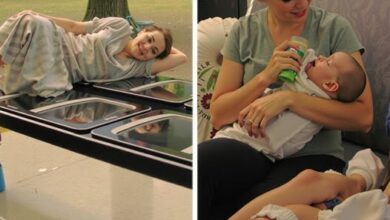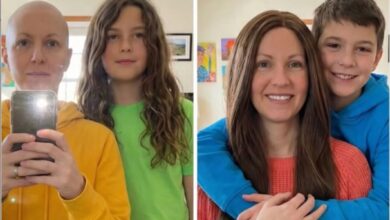
When Stepmom Took the Keys, Karma Had Other Plans!
When my mother passed away, she left me her lake house — not just a property, but the beating heart of my childhood. It stood at the edge of a quiet lake surrounded by birch trees, the water calm enough to mirror the sky. Inside, every corner carried her imprint — the scent of oil paint, her worn brushes lined neatly on the windowsill, the half-finished canvas she never completed.
I spent my summers there with her — painting at dawn, skipping stones until sunset, sipping cocoa in the window seat while rain danced on the glass. It wasn’t just a place; it was the story of us.
When I inherited the house at twenty-one, I made a promise — to keep it exactly as it was. I told my father and his new wife, Carla, that no one was to enter without me. Not out of possessiveness, but respect. The lake house was sacred ground.
Carla didn’t see it that way.
From the moment she married my father, she made her disdain for my mother clear. My mother’s taste, her art, even her memory — all of it became a target for Carla’s mockery. She called my mom’s art “dusty,” her vintage furniture “dated,” her warm color palette “hippie nonsense.”
In her world, modern meant better — glass, chrome, marble, sterile white. Everything my mother’s house was not.
For five years, I avoided confrontation. I kept the lake house locked, visited quietly on anniversaries, and maintained it alone. My father rarely asked about it, and that suited me fine. I didn’t trust Carla’s respect for boundaries.
Then came the fifth anniversary of my mother’s death.
I made the drive up the familiar winding road, past the pines and the sign that always leaned slightly to the left. The air was crisp, the lake glimmering under early autumn sun. But as I turned the final corner, my heart stopped.
Four cars were parked out front. Loud music thumped through the open windows.
I killed the engine and stared in disbelief. Through the glass, I could see people moving — laughing, drinking, holding red cups. The house that had always smelled of lavender and paint now reeked of cheap beer and cigarette smoke.
And there she was. Carla.
Draped in designer clothes, she was holding court in the living room — my mother’s living room. My mother’s embroidered pillow was under someone’s boots. The vase Mom made in her pottery class lay shattered near the fireplace. Carla was laughing, gesturing toward one of Mom’s paintings — the one she’d painted of me at ten — and saying something I couldn’t hear. But the sneer on her face said enough.
I didn’t barge in. I didn’t scream. I simply turned around, walked back to my car, and drove off.
What she didn’t know — what no one knew — was that I’d installed small, discreet security cameras after the last break-in at the property.
That night, I watched every second of footage.
Carla unlocking the door with a key. My key.
Her friends pouring wine in the kitchen, laughing about how “bohemian” everything looked.
Her mocking my mother’s portrait.
Her taking down one of the stained-glass pieces from the window — my mother’s favorite — and accidentally dropping it. It shattered into a hundred glittering shards.
And the worst part: she smiled.
That was the moment the sadness hardened into something sharper.
I didn’t sleep. I gathered every piece of evidence — the footage, the timestamps, the texts she’d sent to her friends bragging about “finally seeing the famous lake house.” She’d even joked about how “creepy” my mother’s paintings were and said she was thinking of redecorating.
The next morning, I called my lawyer.
Trespassing. Property damage. Theft. It wasn’t just personal anymore — it was criminal.
When my father found out, he tried to mediate. “She made a mistake,” he said weakly. “She didn’t mean any harm.”
I looked at him, my voice steady. “Dad, she stole from me. From Mom. From you.”
He said nothing. Maybe he knew I was right. Maybe he was too tired to fight her battles anymore.
The legal process took months, but the outcome was clear. The footage was undeniable. The judge didn’t care about family politics — only facts. Carla was charged with trespassing and destruction of property. A civil judgment ordered her to pay damages and issued a restraining order keeping her a hundred yards from the house.
The day the verdict came down, my father packed a bag and left their home. Their marriage unraveled quietly. There was no explosive fight, just silence — the kind that says everything’s been broken for too long.
When he called me weeks later, he sounded defeated. “I’m sorry,” he said.
I didn’t need to ask what for.
In the spring, I drove back to the lake house. The snow had melted, and the air smelled like wet pine. I walked through the door — my door — and stood still for a long time.
The chaos was gone. The house was clean again, the art restored. I’d replaced the shattered glass with new stained panels that caught the light in even brighter colors.
I sat by the window seat with a cup of coffee, watching the reflection of the birch trees ripple across the water. The quiet returned — the kind that doesn’t feel lonely, just sacred.
I whispered, “I love you, Mom. It’s safe again.”
For the first time in years, I didn’t feel grief. I felt peace.
The lake house had survived storms, neglect, and betrayal — but its soul remained untouched. It wasn’t just a structure of wood and stone. It was a promise. A reminder that love, once rooted, doesn’t rot — it holds.
People like Carla can’t understand that. To them, everything is about ownership, appearance, control. But this house taught me that some things can’t be stolen, no matter how many keys they take.
Karma doesn’t always come loud. Sometimes it arrives quietly — through justice, through truth, through the collapse of everything false.
Months later, a letter arrived in my mailbox — from Carla. No apology. Just one line: “You destroyed my life.”
I folded the letter and tossed it into the fire.
Because she was wrong. She had destroyed her own.
The lake house still stands today, just as my mother left it. The walls hum with the scent of old paint and pinewood. The same window seat waits for the morning light. Every summer, I bring fresh flowers, play her favorite records, and paint at the same easel she once used.
And every time the breeze ripples across the lake, I hear her laughter — light, patient, eternal.
The house isn’t just mine. It’s hers. It always will be.
And as long as I have breath, no one — not even karma’s target — will ever take the keys again.




